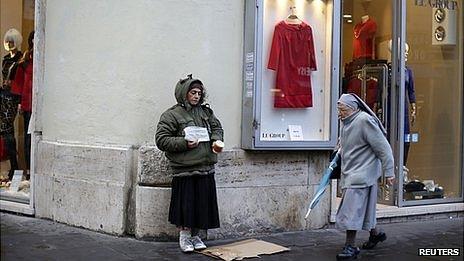Eurozone crisis: Troubling year ahead
- Published
- comments

Beggar in Rome: Italy's debt mountain remains a source of anxiety
Europe's leaders, at the start of the year, would have settled for how 2012 is ending.
The worst of the predictions did not come true. The eurozone has survived intact, but it is still a currency in intensive care.
Recently I asked the German Finance Minister, Wolfgang Schaeuble, how far we were through the crisis and he thought somewhere between 50 and 60%.
Positive signs
Firstly - for those who see the glass half-full.
Europe's leaders demonstrated their absolute commitment to defend the euro and the markets have started to believe them.
The President of the European Central Bank (ECB), Mario Draghi, was the star of the year. By promising to do whatever it takes to defend the currency he brought down the borrowing costs of countries like Spain and Italy. His promise remains untested, but the markets are wary of betting against the bank.
To the often-asked question of what stands behind the euro - the answer is now the ECB.
One of the ratings agencies said "the future of the euro will be decided at the gates of Rome". Under Prime Minister Mario Monti's stewardship, Italy's borrowing costs shrank and reforms are being pushed through.
Europe has committed itself to a banking union - and a European supervisor of the eurozone's big banks. It will involve a large transfer of national authority to a European institution - the ECB. Considering the banks have been at the heart of the crisis, this is a hugely significant step.
Once the banking supervisor is in place, troubled banks will be able to apply for help directly from the permanent bailout fund, the European Stability Mechanism (ESM). It should mark the end of banking problems ending up on government books and forcing up their debts.
Greece did not leave the euro - something many German MPs and officials had suggested as recently as July. The word "Grexit" is no longer heard in the land. Greek Prime Minister Antonis Samaras is judged "serious" and "reliable".
Frau Europe - Angela Merkel - is almost certain to be re-elected as German chancellor in September, although it may make her even more cautious in the short term.
And now the bad news...
Secondly - for those who see the glass as half-empty.
If you look at the real economy, instead of the eurozone's new architecture, the outlook for 2013 is bleak. More countries are heading into recession and unemployment is still rising.
The Greek problem has been rolled over. Almost no one believes that its debts are sustainable. Sooner or later some of its debt will have to be written off. The German taxpayers, at some stage, are likely to be told they will lose money in Greece.
Spain's economy is caught in a cycle of decline. Almost no one expects it to emerge from recession in 2013. It has proved the critics wrong so far, but early next year the question will return - will Spain need a full bailout? That is a problem unresolved. Its social fabric is fraying. Every large-scale demonstration has become more violent.
Italy has entered a period of political instability. , external may prove to be less of a player than imagined just a few weeks ago, but there is still likely to be jockeying for power. Mario Monti, the market's favourite, may yet be anointed as the next leader, but the reforms are far less impressive than heralded and Italy is stuck in recession.
Anti-austerity backlash
The British are tiring of the European project and some Europeans are tiring of British exceptionalism. The real political debate about Britain's future in Europe has yet to begin. It will start with David Cameron's "big speech" early in the New Year.
France is the country that makes the Germans queasy. Officials in Berlin believe the first months of Francois Hollande's administration have been a lost opportunity. The new French president has made delivering on his election promises his priority. What French critics want to see is a commitment to modernise France with far-reaching structural reforms.
Across Europe there is growing resistance to austerity. Some European officials have told me we are now entering the most dangerous period - waiting for the reforms to deliver. One senior official said that if growth does not return in two years all bets are off.
Verdict: A better year than Europe expected, but next year is full of challenges. If you accept, as a senior German official does, that more than 50% of economic policy is about psychology, then the mood is more hopeful than had been expected. My tip for 2013 is to spend less time looking at institutional changes and more at the real economy.
The future of the eurozone may well be determined by whether Europe's people have the patience to see if cutting deficits at a time of recession delivers.